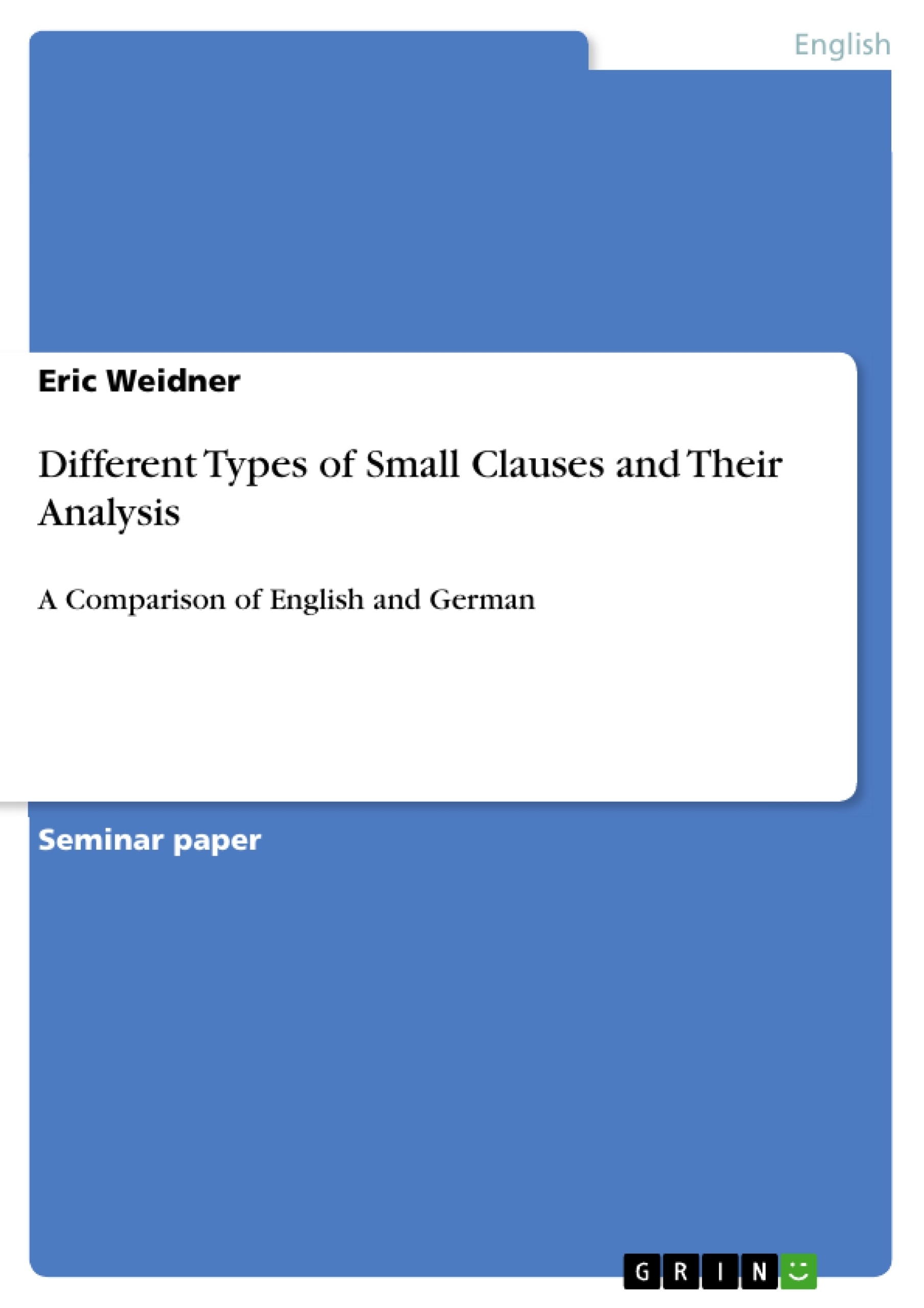In this term paper, I will deal with some aspects of Small Clause (SC) analysis in English. The first chapter will explain what SCs are and present a general overview of their position in sentences. Furthermore I will briefly introduce a controversial analysis and consider the advantages of the SC analysis, as opposed to a predication analysis for example. Therefore several constituent tests will be applied to show that SCs can really function as syntactic units. Some semantic aspects will also be discussed to prove that they should be treated as units.
In the next chapter I will introduce different types of SCs. German will be considered as well and a comparison of both English and German SCs will be presented. The argument for the existence of German SCs is very similar to the English. For this reason I will not present the line of reasoning once more but simply assume the same syntactical phenomenon for German as well (for a more detailed analysis of German Small Clauses see Staudinger 1997: 111-115). It will be argued that English offers some more possible constructions with SCs than German. This observation leads to the conclusion that there are some significant differences between the two languages.
In a last step a possible analysis for the internal structure of Small Clauses will be presented. The need for a special analysis will be explained with respect to case-assignment. Then the suggested analysis will be applied to the presented types in unmarked word order to see if it is appropriate in practice. I will focus mainly on English here because an analysis of German SCs has to put up with different problems. Some of these struggles will also be discussed here.
In the conclusion the results of the previous chapters will be summarized. In addition some ideas for further research beyond the content of this paper will be given.
Table of Contents
- Introduction
- What is a Small Clause?
- Different Types of Small Clauses in English and German
- Small Clauses as Complements to Verbs
- Small Clauses as Complements to Prepositions
- Independent Small Clauses
- Small Clauses as Adjuncts
- Small Clauses as Subjects
- Resultative Small Clauses
- The different Small Clauses in German and English
- The Inner Structure of Small Clauses
- Analysis of Small Clauses with Aarts (1992)
- Analysis of the Different Types of Small Clauses in English
- Analysis of the Different Types of Small Clauses in German
- Conclusion
Objectives and Key Themes
This term paper examines the concept of Small Clauses (SCs) in English, focusing on their structure and function within sentences. It aims to provide a comprehensive overview of SC analysis, comparing the phenomenon in both English and German. The paper will analyze different types of SCs, explore their internal structure, and consider the advantages of an SC analysis compared to alternative interpretations. The key themes explored include:- Definition and general characteristics of Small Clauses
- Analysis of different types of Small Clauses in English and German
- The internal structure of Small Clauses and the role of case-assignment
- Comparison of SC constructions in English and German, highlighting significant differences
- The theoretical arguments supporting the existence of Small Clauses, both syntactically and semantically
Chapter Summaries
Introduction
This chapter introduces the concept of Small Clauses (SCs) as verbless clauses with a subject-predicate relationship. It discusses the general structure of SCs and outlines the main arguments for analyzing them as distinct syntactic units. This includes presenting constituent tests to demonstrate their syntactic function and exploring semantic aspects that support their independent status. The chapter also briefly touches upon the debate surrounding the existence of an implicit verb 'be' in SCs.What is a Small Clause?
This chapter delves deeper into the definition and analysis of Small Clauses. It outlines the structure of SCs as [NP XP], where XP can be an adjective phrase (AP), noun phrase (NP), or prepositional phrase (PP). Examples of each type are provided, along with a discussion of agreement properties between the NP and XP. The chapter then explores arguments against the SC analysis, presenting a counter-argument based on constituent tests, coordination, clefting, and constituent response. Finally, it highlights the role of nonreferential 'it' in SCs as further evidence for their existence.Different Types of Small Clauses in English and German
This chapter introduces different categories of Small Clauses in both English and German, including those functioning as complements to verbs and prepositions, as well as independent Small Clauses, adjuncts, subjects, and resultative Small Clauses. It highlights the similarities and differences in SC constructions between the two languages.The Inner Structure of Small Clauses
This chapter focuses on the internal structure of Small Clauses. It presents an analysis based on Aarts (1992), discussing case-assignment and the implications for different types of SCs. The chapter primarily examines the analysis of English SCs, touching upon the challenges of analyzing German SCs in a similar manner.Conclusion
(Note: We are instructed to avoid content from the conclusion or final chapter to avoid spoilers.)Keywords
This study focuses on the grammatical structure of Small Clauses (SCs) in English, exploring their function within sentences and comparing their properties to those found in German. Key concepts include verbless clauses, subject-predicate relations, constituent tests, case-assignment, and syntactic analysis. The paper highlights the debate surrounding the existence of SCs and presents arguments supporting their analysis as distinct syntactic units.- Citation du texte
- Eric Weidner (Auteur), 2003, Different Types of Small Clauses and Their Analysis, Munich, GRIN Verlag, https://www.grin.com/document/127135



